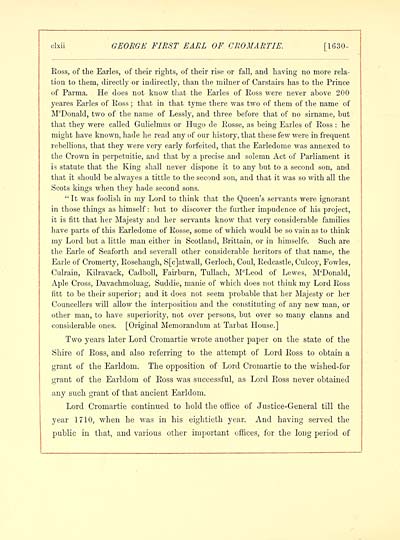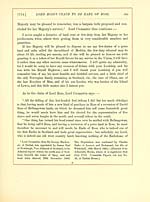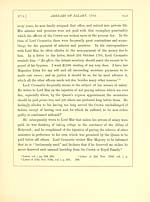Earls of Cromartie > [NSLBLANK]
(212)
Download files
Complete book:
Individual page:
Thumbnail gallery: Grid view | List view

clxii GEORGE FIRST EARL OF ROM ARTIE. [1630-
Boss, of the Earles, of their rights, of their rise or fall, and having no more rela-
tion to them, directly or indirectly, than the milner of Carstairs has to the Prince
of Parma. He does not know that the Earles of Eoss were never above 200
yeares Earles of Eoss ; that in that tyme there was two of them of the name of
JVEDonald, two of the name of Lessly, and three before that of no sirname, but
that they were called Gulielmus or Hugo de Eosse, as being Earles of Eoss : he
might have known, hade he read any of our history, that these few were in frequent
rebellions, that they were very early forfeited, that the Earledome was annexed to
the Crown in perpetuitie, and that by a precise and solemn Act of Parliament it
is statute that the King shall never dispone it to any but to a second son, and
that it should be alwayes a tittle to the second son, and that it was so with all the
Scots kings when they hade second sons.
" It was foolish in my Lord to think that the Queen's servants were ignorant
in those things as himself : but to discover the further impudence of his project,
it is fitt that her Majesty and her servants know that very considerable families
have parts of this Earledome of Eosse, some of which would be so vain as to think
my Lord but a little man either in Scotland, Brittain, or in himselfe. Such are
the Earle of Seaforth and severall other considerable heritors of that name, the
Eaiie of Cromerty, Eosehaugh, S[c]atwall, Gerloch, Colli, Eedcastle, Culcoy, Fowles,
Culrain, Kilravack, Cadboll, Fairburn, Tullach, M c Leod of Lewes, M'Donald,
Aple Cross, Davachmoluag, Suddie, manie of which does not think my Lord Eoss
fitt to be their superior; and it does not seem probable that her Majesty or her
Councellers will allow the interposition and the constituting of any new man, or
other man, to have superiority, not over persons, but over so many claims and
considerable ones. [Original Memorandum at Tarbat House.]
Two years later Lord Cromartie wrote another paper on the state of the
Shire of Eoss, and also referring to the attempt of Lord Eoss to obtain a
grant of the Earldom. The opposition of Lord Cromartie to the wished-for
grant of the Earldom of Eoss was successful, as Lord Eoss never obtained
any such grant of that ancient Earldom.
Lord Cromartie continued to hold the office of Justice-General till the
year 1710, when he was in his eightieth year. And having served the
public in that, and various other important offices, for the long period of
Boss, of the Earles, of their rights, of their rise or fall, and having no more rela-
tion to them, directly or indirectly, than the milner of Carstairs has to the Prince
of Parma. He does not know that the Earles of Eoss were never above 200
yeares Earles of Eoss ; that in that tyme there was two of them of the name of
JVEDonald, two of the name of Lessly, and three before that of no sirname, but
that they were called Gulielmus or Hugo de Eosse, as being Earles of Eoss : he
might have known, hade he read any of our history, that these few were in frequent
rebellions, that they were very early forfeited, that the Earledome was annexed to
the Crown in perpetuitie, and that by a precise and solemn Act of Parliament it
is statute that the King shall never dispone it to any but to a second son, and
that it should be alwayes a tittle to the second son, and that it was so with all the
Scots kings when they hade second sons.
" It was foolish in my Lord to think that the Queen's servants were ignorant
in those things as himself : but to discover the further impudence of his project,
it is fitt that her Majesty and her servants know that very considerable families
have parts of this Earledome of Eosse, some of which would be so vain as to think
my Lord but a little man either in Scotland, Brittain, or in himselfe. Such are
the Earle of Seaforth and severall other considerable heritors of that name, the
Eaiie of Cromerty, Eosehaugh, S[c]atwall, Gerloch, Colli, Eedcastle, Culcoy, Fowles,
Culrain, Kilravack, Cadboll, Fairburn, Tullach, M c Leod of Lewes, M'Donald,
Aple Cross, Davachmoluag, Suddie, manie of which does not think my Lord Eoss
fitt to be their superior; and it does not seem probable that her Majesty or her
Councellers will allow the interposition and the constituting of any new man, or
other man, to have superiority, not over persons, but over so many claims and
considerable ones. [Original Memorandum at Tarbat House.]
Two years later Lord Cromartie wrote another paper on the state of the
Shire of Eoss, and also referring to the attempt of Lord Eoss to obtain a
grant of the Earldom. The opposition of Lord Cromartie to the wished-for
grant of the Earldom of Eoss was successful, as Lord Eoss never obtained
any such grant of that ancient Earldom.
Lord Cromartie continued to hold the office of Justice-General till the
year 1710, when he was in his eightieth year. And having served the
public in that, and various other important offices, for the long period of
Set display mode to:
![]() Universal Viewer |
Universal Viewer | ![]() Mirador |
Large image | Transcription
Mirador |
Large image | Transcription
Images and transcriptions on this page, including medium image downloads, may be used under the Creative Commons Attribution 4.0 International Licence unless otherwise stated. ![]()
| Histories of Scottish families > Earls of Cromartie > [NSLBLANK] > (212) |
|---|
| Permanent URL | https://digital.nls.uk/96759836 |
|---|
| Attribution and copyright: |
|
|---|---|
| Description | A selection of almost 400 printed items relating to the history of Scottish families, mostly dating from the 19th and early 20th centuries. Includes memoirs, genealogies and clan histories, with a few produced by emigrant families. The earliest family history goes back to AD 916. |
|---|

